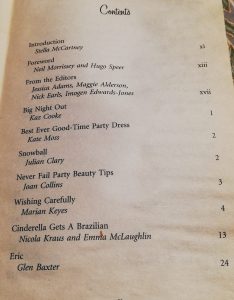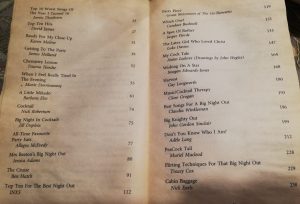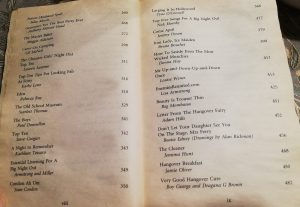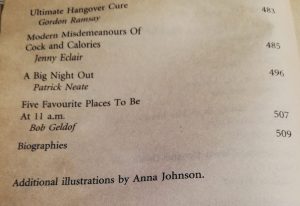Big Night Out is a collection of short stories, recipes, song lists, illustrations and edited by Jessica Adams, Maggie Alderson, Nick Earls and Imogen Edwards-Jones. It was published to benefit the War Child charity.
Finished on: 25.11.2017
Big Night Out isn’t your typical short story collection. There really is a lot here that isn’t a short story at all, although the biggest part are short stories. I grabbed it for those (well, I grabbed it mostly for Jasper Fforde‘s short story in it), so I mostly skimmed through the other things, even though some very big names contributed various things (INXS, Steve Coogan, and Nick Hornby recommending songs? Anthony Stewart Head sharing a cocktail recipe? Joan Collins‘ beauty tips? Gordon Ramsay, Jamie Oliver, and Boy George detailing hangover cures? It’s all there). I did feel that the selection was made on the basis of the people in any case and not necessarily for the quality of their content. But hey, it is for charity after all. If you don’t buy it for the stories, but for the good deed, you’ll get what you expect.
After the jump, I will talk about the short stories in the collection separately and you can find the table of contents so you can see what else is in there.
Wishing Carefully (Marian Keyes)
Kate wishes for a fairy tale romance and things become a little too literal.
Wishing Carefully reads a little like an aborted short story project that sounded like a fun idea but wasn’t all that fun to write and then the charity knocked on the door, so the idea got dusted off and quickly finished, although it never quite comes together.
Cinderella Gets A Brazilian (Nicola Kraus and Emma McLaughlin)
Kate is busy and doesn’t have time for anything, but when she hears that the guy who she had the most wonderful moment with and then never called her will come to a party, she only has a little time to get ready to make him regret he never did.
The story is written in second person which is always a bold choice and can easily go wrong. It doesn’t go wrong here, but it is a story that made me feel absolutely tired at what women have to perform – and I would have wished the story would have challenged the status quo more instead of celebrating the strength women find within it.
Ready For My Close-Up (Karen Moline)
Sitting in a luxury hotel in Jamaica, cheating on her husband with her best friend (who is in turn cheating on his wife), the protagonist gets an unusual offer she may even be willing to take.
Ready For My Close-Up was fine. Not great and it could have been a little more fleshed out and less stereotypical (and racist with its fetishizing of Jamaicans), but at least it’s a quick read that engages emotionally.
Getting To The Party (James Holland)
Edward is a pilot in the war. He met Diana there and they hit it off. Diana invited him to a party at her parents’ place and he has to organize the transport there.
Getting To The Party didn’t really jive with me. On the one hand, I felt like it was overawed by the military, on the other hand, the ending, where a build-up of the duties and sacrifices of soldiers should have paid off, fell flat. Maybe we just didn’t get to spend enough time with Diana and Edward to really feel invested in them.
When I Feel Really Tired in the Evening (Marie Darrieussecq; translated by Adriana Hunter)
Once a month, the protagonist gets to make a visit in an hospital. It’s a very special visit and she’d like to go more often, but it’s not allowed.
I feel like that either I am missing something from the story or that there is something missing in the story. In any case, I got the distinct impression that it was a sample chapter for a larger work and not a thing that’s supposed to stand on its own, which left me a little dissatisfied, albeit not uninterested.
A Little Mikado (Barbara Else)
Maisie spends most of her time in the senior home not talking. Unlike other people (like Rowena), she keeps herself to herself and is better for it. But when the home is planning an outing to see The Mikado, Maisie as a former actress knows she has to go.
A Little Mikado is cute in maybe a little too superficial a way. But as a sweet, quick bite inbetween, it works very nicely. (Although since I suspect that The Mikado isn’t the least racist musical around, without knowing anything about it, it would have been nice if it had been any other play the story revolved around.)
Mrs Beeton’s Big Night Out (Jessica Adams)
Mrs Beeton is asked to give out some of her famous recipes for this collection. She does, hoping it will lead to her own cooking show.
The story shines with a very weird sense of humor that I found rather enjoyable, but in a way that made me forget most of it immediately after having read it.
The Cruise (Ben Hatch)
Jez is supposed to write an article about a cruise to Alaska. He embarks on it with his girlfriend Janine and plans to propose to her, but that’s easier said than done.
The Cruise is just so… straight. Heteronormative. Sexist. It annoyed me way too much to enjoy it.
Which One? (Candace Bushnell)
William’s girlfrien is pregnant, and he feels he has to get away. So he goes to LA to meet his best friend Holt, take drugs and fuck everyone.
William is such an asshole and the story does try to take him down a peg in the end, but it’s not really successful at that. Nevertheless, even though I don’t like reading about assholes all that much, Bushnell makes the story pretty hard to put down.
A Spot Of Bother (Jasper Fforde)
Alex should be going to an award ceremony, but since there is a gorilla in his garden in Weybridge, he doesn’t dare to. He calls Simian Seizure and Containment instead, hoping that this will solve his problem.
A Spot of Bother is weird in a very Fforde way in that it just treats the absurd as a matter of fact. It’s not the best thing he’s ever written, but it’s amusing and very enjoyable.
The Latex Girl Who Loved Christ (Luke Davies)
Cecile used to be a sex worker but now she has found Christ. That doesn’t necessarily keep her from being a little kinky though.
The Latex Girl Who Loved Christ could have been a rejection of the virgin-whore dichotomy, but instead it reads like the fantasy of a guy who gets off on that very dichotomy. Hard pass from me.
Wishing On A Star (Imogen Edwards-Jones)
Kate has always had a crush on Karl Stanford and her dreams seem to come true when he invites her for a drink after a play. But things don’t go quite as expected.
It feels rather obvious where things are headed in this story, maybe also because it’s really very short, but it is a nice read.
Harvest (Gay Longworth)
Daniel came to London to study English and he is doing is best, despite the poverty he has to face. When he meets Lizzie, he is sure that things are looking up for him.
While the general story trope may be old, Longworth does subvert it a little, but mostly, she managed to make me feel attached to and worried about Daniel pretty quickly, building an emotional core that makes the story work.
Big Knighty Out (John Gordon Sinclair)
David gets invited to go camping with Garshay and Wub, but since they usually bully him, he is loath to accept the invitation. But they won’t accept no as an answer.
The story isn’t bad, it’s pretty short, but mostly it just made me shrug.
Don’t You Know Who I Am? (Adèle Lang)
Dallas is a star and is supposed to record her life story so a biography can be written about her, although she is only 19 years old. Her glamorous life isn’t all it cracked up to be, though.
I assume Lang was going for a critique of celebrity culture, but a lot of it just feels like shitting on a teenage girl for being vapid and I don’t need that shit.
Cabin Baggage (Nick Earls)
Brad meets Claudia on his flight to London and they hit it off, spending it talking and laughing and bonding. Even after they land, Brad can’t stop thinking of her.
Cabin Baggage was a sweet story, a literal meetcute with a nice sense of humor. I enjoyed reading it a lot.
Future Husband Spell (Julia Morris)
On holiday, the narrator meets Emily who is gorgeous and wonderful and instantly becomes her best friend. Emily proposes that the narrator might hit it off with Emily’s brother and sets them up on a date.
Future Husband Spell is very Sex and the City with all the positive and negative that comes with that. It’s entertaining, but the heternormativity of it is staggering.
The Master Baker (Maggie Alderson)
Every year, Emily, Daniel, Sveta, Tom and Nic spend Christmas together. This year, Nic brought his new boyfriend, Ricky. But Ricky seems to play his own game.
Well, this is basically a rape story that doesn’t realize it’s a rape story. Instead it thinks it’s a fun sex story and that sucks absolutely and I hated it.
Carry on Camping (Gil McNeil)
Kate is going on a date, her first in a long time. Meanwhile her best friend has Kate’s son camping with her son in her garden, juggling kids and a hamster. It remains to be seen who has the better night.
Carry on Camping is cute. Not terribly exciting and not revolutionary in any sense of the word, but it’s fun and a quick read.
Eden (Rebecca Ray)
Two men sit around a fire at night, talking about the search for the perfect house in a city filled with empty houses.
Eden has a lyrical quality and you could probably interpret it in many ways, but I rather enjoyed just letting myself get caught in the mood of the story with its slightly out of this world feeling.
The Old School Museum (Scarlett Thomas)
Simon, John and the narrator have buried a timecapsule on New Year’s Eve 1999. Now it’s only a couple of months later, but they need to dig it back up.
The Old School Museum is a nice story, though I didn’t love it as much as I loved Thomas’ novel The End of Mr. Y. It builds from a nice idea, has vivid characters and a sly sense of humor.
A Night To Remember (Kathleen Tessaro)
Waking up in a strange room with only a fuzzy memory of the night before, the narrator tries to piece together what exactly happened before the guy she apparently slept with comes back from the bathroom.
Apart from a more or less inexplicaple bit where the narrator shits on gingers and fat people, A Night To Remember was quite okay. It’s also pretty short, so you barely get started before it’s over again.
Condon Ah Um (Sean Condon)
On holiday in New York, Sean falls quite ill. He suspect it might be something bad as he had recently pulled some porcupine quills out of a stray dog’s mouth. So he takes himself to the emergency room and hopes for the best.
I think Condon Ah Um is supposed to be funny, but it didn’t work for me. Neither the description of the emergency room, nor the illness struck me as particularly laughable and the latter felt a lot like man-flu (although it is made clear that it isn’t), which is not the most interesting subject matter. But it was okay.
Larging It In Hollywood (Tyne O’Connell)
Clara and Mags are best friends and write screenplays (mildly successfully) together. But Mags is about to get married and Clara has to stop her.
Honestly, I lost count how often Clara mentions that she is forty-something (often coupled with the word “girl”) and what that means that she can or cannot do. That was annoying enough, but then the entire thing ends with “Forty-something women are like that, so are twenty-something and sixty-something women for that matter.” At that point, my eyes wanted to roll out of my head, so it was a good thing that the story was over then.
Come April (Jeremy Dyson)
Tyna is a sex worker, famed for her blow jobs. When two buddhist monks come seeking her service, she is pretty surprised though.
The way this story writes about sex work(ers) doesn’t sit right with me, although it isn’t outright judgemental or anything else I could point to directly there. What I can point out very clearly though, is the repeated use of racial slurs that is entirely unnecessary.
Iron Lady, Ice Maiden (Bruno Bouchet)
The narrator meets Catherine by chance and is immediately intrigued by her. Himself a member of the Labour Party, he soon becomes more involved with Catherine’s more radical left politics – and Catherine herself.
I don’t know about the tone of this story. It felt like all it did was make fun of left party structures, politics and its rhetoric, as well as feminism. Being a lefty feminist myself, I didn’t appreciate that, although I do think that Bouchet didn’t so much want to discredit left politics, but just joke about it. The way he did it, though, is much more the former than the latter.
Mr Up-and-Down-Up-and-Down Once (Louise Wener)
There’s a new Rolls Royce in the neighborhood. It belongs to Mr Dobrin. The narrator is very curious about it, so when Mr Dobrin invites him along for a ride, he accepts. But the way Dobrin keeps talking about the narrator’s sister is less awesome than the car.
Mr Dobrin was almost physically repulsive to me. It was very well captured by Wener. The plot of the story was less convincing and I also didn’t appreciate how they framed “Mr Up-and-Down-Up-and-Down”, an old man with Alzheimer’s who also lives in the street. It just wasn’t very sensitive.
EnemiesReunited.com – Absinthe Makes the Heart Grow Fonder (Lisa Armstrong)
Sarah receives a letter from her former school mate Sheba. They used to have a competitive and not very friendly relationship in school. As they meet again, Sarah realizes that Sheba is now a wheelchair user. Motivated by pity at first, she spends more time with her and the two become fast friends.
EnemiesReunited.com is a bit too long and uses a trope that is ableistic, but at least the characters were drawn well enough. I just wish that I could have related to anyone in the story even the tiniest bit.
Letter From The Hangover Fairy (Adam Hills)
Letter From The Hangover Fairy is literally a letter from The Hangover Fairy, complaining about the state of things and his job.
I thought the idea was cute and since the story is only a couple of pages long, it definitely doesn’t overstay its welcome. I liked the idea of the overtaxed fairy trying to outsource in any case.
Don’t Let Your Daughter See You On The Stage, Mrs Ferry (Beatie Edney; illustrated by Alan Rickman)
Emily is very excited. Something special is happening: first she was allowed in her mother’s dressing room, then she got dressed up and now she’s going to the theater. Being only three and three quarters years old, she really doesn’t know what’s in store for her there.
The story tries very hard to stay in Emily’s perspective, but it felt only moderately believable as the perspective of such a small child. But I did like the story idea. The illustrations – there were two of them – are rather simple and small and didn’t impress me a whole lot.
The Cleaner (Jemima Hunt)
Birdie is a cleaner who takes her job seriously, but she’s been doing it for a while and she has her ways. For the Beaumonts, she has been cleaning for years now and it’s again their day.
The Cleaner ends just when things start to get moderately interesting. I mean, Birdie is an engaging character, but the story doesn’t have much of an arc and I would have liked it if it had.
Modern Misdemeanours Of Cock and Calories (Jenny Eclair)
Stanley can’t stand his wife Sylvia anymore, but he loves his visits with sex worker Lorna. Elizabeth and Simon, meanwhile, aren’t particularly happy either, but Simon has his own outlet.
I don’t know, I think this story is trying to make a point, but I’ll be damned if I could say what it was. Instead it’s pretty much a fatphobic slap in the face that also treats sex workers weirdly. Plus, all the people here are pretty much unlikeable, and I don’t know why I should want to share in their misery.
A Big Night Out (Patrick Neate)
Bone is getting ready for Christmas Eve at The Cobbler’s – or as he likes to call it, the Best Night of the Year.
Bone is a little (very) sad and he doesn’t know it at all. It’s not easy to pull off a character like that, but Neate managed for the most part, although I could have done without the objectification of women that Bone is performing almost constantly.
Summarizing: not really worth it, if you ask me. Well, for the charity maybe, but then it would probably be easier to just give them money directly.
You can find the entire Table of Contents below:




